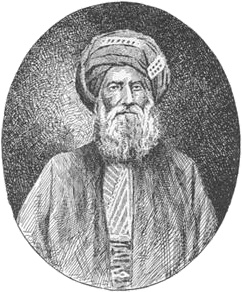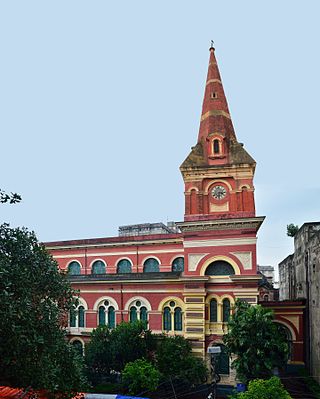Byculla is an area of South Mumbai.
The history of the Jews in India dates back to antiquity. Judaism was one of the first foreign religions to arrive in India in recorded history. Indian Jews are a small religious minority who have lived in India since ancient times. The 2,000-year history of Indian Jews was marked by a total absence of antisemitism from the Hindu majority and a visible assimilation in the local languages and cultures.

The Ohel Leah Synagogue and its next-door neighbors, the Jewish Recreation Club and the Jewish Community Centre, have formed the center of Jewish social and religious life in Hong Kong for over a century. Originally the community was mostly Baghdadi and the synagogue was under the superintendence of the Haham of the Spanish and Portuguese Congregation of London: it is now fully independent and has members from across the Jewish diaspora.

The former communities of Jewish migrants and their descendants from Baghdad and elsewhere in the Middle East are traditionally called Baghdadi Jews or Iraqi Jews. They settled primarily in the ports and along the trade routes around the Indian Ocean and the South China Sea.

David Sassoon was the treasurer of Baghdad between 1817 and 1829. He became the leader of the Jewish community in Mumbai after Baghdadi Jews emigrated there.
Solomon F. Sopher is the president of the Baghdadi Jewish community in Mumbai, India. He also serves as the Trustee of the David Sassoon Fund, and as the chairman and managing director of Sir Jacob Sassoon Trust, which manages the Knesset Eliyahoo synagogues in Mumbai, as well as the Magen David and the Ohel David synagogues at Pune, India.

The Knesset Eliyahoo, also Knesset Eliyahu, is an Orthodox Jewish synagogue located in downtown Mumbai, India. It is the city's second oldest Sephardic synagogue. It was established in 1884 by Jacob Elias Sassoon, son of Eliyahoo David Sassoon and grandson of David Sassoon; the latter had immigrated from Baghdad to India in 1832 due to persecution and had settled in Mumbai, then known as Bombay. It is maintained by the Jacob Sassoon Trust. The building's significance is attributed to its Jewish traditions as well as Indian and English colonial influences.

The Maghen Abraham Synagogue is one of the main synagogues in Lebanon.

There are many synagogues in India, although many no longer function as such and today vary in their levels of preservation. These buildings dating from the mid-sixteenth through the mid-20th century once served the country's three distinct Jewish groups—the ancient Cochin Jews, and Bene Israel communities as well as the more recent Baghdadi Jews.
Jews were among the first settlers after Hong Kong became a British colony in 1841. The first Jews arrived in Hong Kong from various parts of the British Empire as merchants and colonial officials. Among the first wave, the Baghdadi Jews stood out especially, including representatives of the influential families of Sassoon and Kadoorie. The construction of the Ohel Leah Synagogue in 1901 marked the beginning of a fully fledged religious life for the city's local Jews.
Salem Shaloam David (1853−?) was a Chinese convert to Judaism.
The history of the Jews in Mumbai, India, began when Jews started settling in Bombay during the first century, due to its economic opportunities. The Jewish community of Bombay consisted of the remnants of three distinct communities: the Bene Israeli Jews of Konkan, the Baghdadi Jews of Iraq, and the Cochin Jews of Malabar.
Eliza Ezra Ezekiel Sassoon High School, Mumbai, India. It is an English medium school recognised by the Maharashtra State Board of Secondary and Higher Secondary Education, Mumbai Division.

Ohel David Synagogue, also called Laal Deval or Laal Deul is a synagogue in Pune, India.

Magen David Synagogue is located at the junction of Brabourne Road and Canning Street in Kolkata. Magen David is the second operating synagogue in Kolkata, the other is the Beth El Synagogue at Pollock Street.

The history of the Jews in Kolkata, formerly known as Calcutta, in India, began in the late eighteenth century when adventurous Baghdadi Jewish merchants originally from Aleppo and Baghdad chose to establish themselves permanently in the emerging capital of the British Raj. The community they founded became the hub of the Judeo-Arabic-speaking Baghdadi Jewish trading diaspora in Asia.

The Ohel Rachel Synagogue is a Sephardi synagogue in Shanghai, China. Built by Sir Jacob Elias Sassoon in memory of his wife Rachel, it was completed in 1920 and consecrated in 1921. Ohel Rachel is the largest synagogue in the Far East, and one of the only two still standing in Shanghai. Repurposed first under the Japanese occupation during World War II and again following the Communist conquest of Shanghai in 1949, the synagogue has been a protected architectural landmark of the city since 1994. It was reopened for some Jewish holidays from 1999 and briefly held more regular Shabbat services as part of the 2010 Shanghai Expo.

David Joseph Ezra was a leading merchant, property developer and communal leader of the Baghdadi Jewish community in Kolkata, India. He was one of the key developers behind nineteenth century Kolkata, and was responsible for many of its most celebrated Victorian buildings and synagogues.

Elias David Joseph Ezra was a property owner in Calcutta, India. He was a member of the Baghdadi Jewish community of that city.























